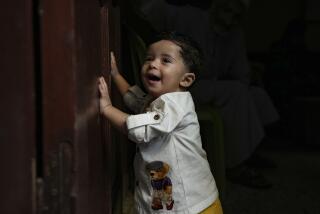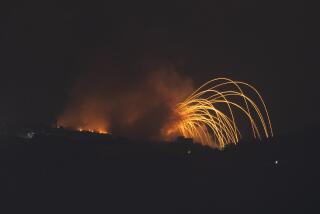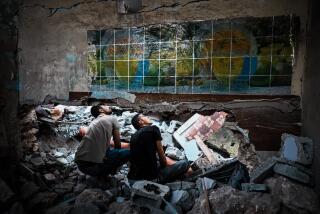Battered Libyan rebels try to keep spirits up
Reporting from Benghazi, Libya â The rebels carried Fathi Ali down a dirt road to his grave.
They fired guns into the air and prayed that God would take him into heaven. Some knelt and pushed away the white shroud for a last look at their comradeâs battered face. The fighters, many just a breath beyond boyhood, vowed to return to the front lines before sunset. Aliâs father wept.
âMy son wanted to go and help the revolution,â said Khaled Mohamed Saad. âI told him it was all right to be a martyr. Itâs the same as if he died or one of my neighborâs sons died. We are all Libyans and we are all suffering. Better to die for freedom.â
Ali was killed Thursday in a bombardment by Moammar Kadafiâs forces attacking rebels in the port of Ras Lanuf.
Airstrikes and artillery pounded the city again Friday and a fuel tank at a refinery burned as insurgents retreated, further losing their grip on a strategic oil hub they had taken days earlier with bravado and pickups laden with high-caliber weapons.
The rebels, who had controlled two sprawling staging areas next to the town and the oil complex were manning a much smaller checkpoint about 15 miles east. Their main line of defense was 70 miles farther east in Port Brega, where antiaircraft batteries were positioned on both sides of the coastal highway.
âWe got attacked by planes and rockets and ships, and we had no way to fight back and stop them,â Issam Darebi, 34, a fighter wearing a black leather coat and military fatigues at the Port Brega checkpoint, said of Thursdayâs retreat. âWe need much bigger weapons.â
Other fighters vowed to stand their ground if Kadafiâs forces take control of Ras Lanuf and launch an assault on Port Brega.
The governmentâs arsenal has outmatched rebel forces causing a dramatic shift in momentum that probably will see the Libyan army push deeper into rebel-controlled territory. That prospect has leaders in the rebel stronghold of Benghazi pressing the international community to establish a no-fly zone to keep Kadafiâs warplanes grounded.
âA no-fly zone is critical,â said Mustafa Gheriani, a spokesman for the rebelsâ national council in Benghazi. âIt will jam Kadafiâs communications, shutdown his air force and be a psychological deterrent for his supporters. We need a no-fly zone to shorten the time of people dying. Kadafi has 3,000 thugs with heavy machinery but thatâs not enough to rule a country.â
As Ali was buried in a graveyard near a cement factory on the edges of this city, four other fighters, with limbs amputated, lay in a nearby hospital. In the main square along the corniche, about 15,000 worshipers cursed Kadafi and spoke of blood and sacrifice at Friday prayers.
âWeâre running out of time. People are dying,â said a man wearing camouflage fatigues and a scarf. âOur rebels are hanging on. Thereâs no turning back anymore. If we stop or surrender, heâll kill us all.â
Fathi Aliâs body was carried past a row of graves to number 277. The plots behind his had been filled; the open ones in front awaited fresh arrivals from the battlefield. The graves were about 4 feet deep and lined with cinderblock. They had been dug quickly by men with shovels and buckets of cement.
Beggars in wheelchairs watched the ragged cortege pass, winding through the gates and down the dirt road. The rebels lifted Aliâs linen-draped body out of a wooden box and scrambled over a dirt mound. Three men jumped into the grave and lowered him in. They pushed back the shroud and gently, as if holding a vase, studied his half-gone face.
Cement slabs sealed the grave shut and men smeared wet mortar with their bare hands over crevices and cracks. Others knelt, pushing rust-colored dirt over the grave until it was filled and a man with a machine gun fired into the air, bullet casings arcing and shining in the sun.
Ali had joined the revolution one week ago. He quit his job as an assistant oil driller and left Benghazi, heading west toward Ras Lanuf. He had no weapon; he wanted to help the rebels with first aid. He was 36, single with no children.
âHe lived his whole life under Kadafi. He knew what it was like,â said his father. âBut when he saw Kadafiâs forces and African mercenaries killing women and children, he said he had to go to the front and do whatever he could do.â
A man with a pistol fired shots into the air. He was angry and walked in circles. Rebels wearing berets gathered. Old men stood behind them.
âI worked with Ali in the oil fields in the desert. He had a pure heart,â said Ellafi Elgetlawi. âHe was like the rest of us. If we didnât go there to meet Kadafiâs army, they could come here. I saw him in the ambulance. An artillery shell had hit near him. I didnât recognize him and later someone told me, âThat was Fathi Ali.ââ
He pulled on his jacket and raised his voice.
âIâm going back to fight today,â he said. âI canât leave the others alone.â
He walked away as flags from another procession stopped at grave 278.
Ayman Abdulkarim was a waiter in a coffee shop. He joined the rebels a week ago too. He died in the same attack that killed Ali. His white-draped body was also lowered into the ground by men with guns while other men dug new holes and mixed mortar, their shovels scraping after everyone had gone.
Times staff writer David Zucchino in Port Brega, Libya, contributed to this report.
More to Read
Sign up for Essential California
The most important California stories and recommendations in your inbox every morning.
You may occasionally receive promotional content from the Los Angeles Times.











